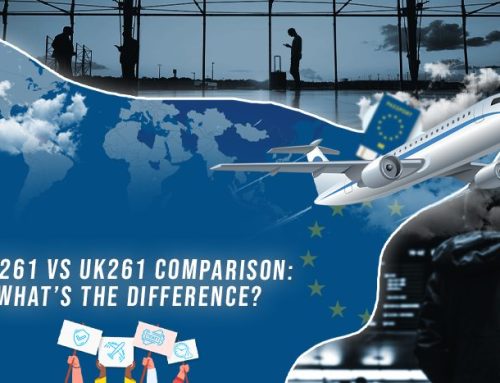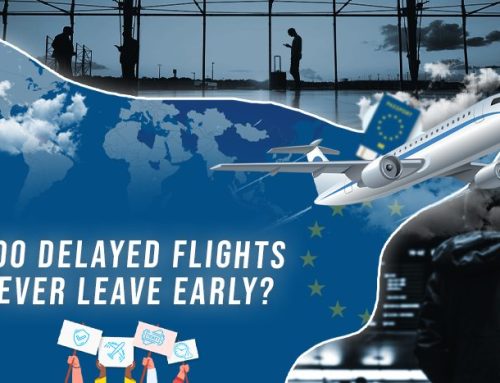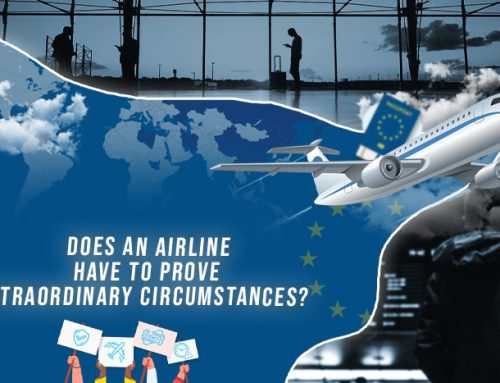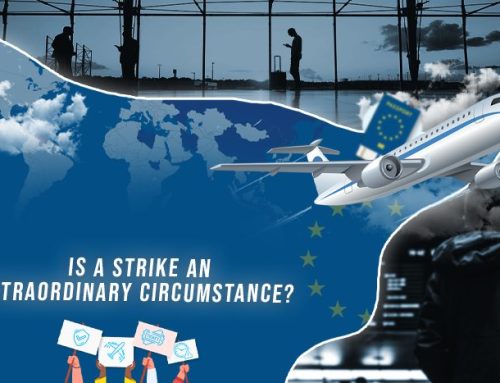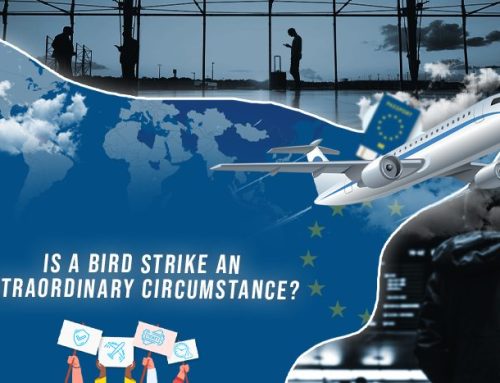EC 261 is in place to hold airlines accountable to their own timetable. If they have a flight delay or cancellation, it can completely derail flights for days, causing a ripple effect across the entire continent. However, not all issues are under their control. These qualify as extraordinary circumstances. Does a technical fault qualify as an extraordinary circumstance? Here’s all you need to know.
Key Takeaways
- EC 261 holds airlines accountable for flight delays, cancellations, and denied boarding, but it depends on whether the issue was within the airline’s control or qualifies as an extraordinary circumstance.
- Whether a technical fault qualifies as an extraordinary circumstance depends on whether it’s related to routine operations or unforeseeable issues beyond the airline’s control. Passengers may be eligible for compensation if the fault was preventable by the airline.
- In addition to technical faults, other extraordinary circumstances include severe weather conditions, strikes, air traffic control issues, and political instability, among others. These events are generally beyond the airline’s control.
- Passengers facing flight disruptions are entitled to compensation under EC 261, with amounts varying based on factors such as flight distance and the location of the airline. Compensation is in addition to rescheduling or refunds.
- Passengers can file claims for compensation with their airline and should gather documentation. If a claim is denied, there is the option to appeal, and partnering with a flight compensation company may be a recourse to pursue rightful compensation.
Technical Faults and EC 261
Whether or not a technical fault qualifies as an extraordinary circumstance depends on the type of fault. If it has something to do with the normal daily operations of the flight, it will not qualify. This is because these issues should have been identified previously as part of routine maintenance.
If they were missed, the airline is at fault, and passengers whose flights were delayed or cancelled because of a technical fault would be covered under EC 261. However, there are circumstances where this would not apply.
If the technical fault is not a part of daily operations, routine maintenance, or checks, then it would qualify. Airlines would have no way to check for the issue prior to it happening, so it is out of their control. This could be a hidden manufacturing defect, tampering, terrorism, or other extenuating circumstances.
How the technical fault occurs will impact if it is covered under EC 261. You can file a claim with your airline with your supporting documentation, and they can determine what if any, compensation you deserve.
What Else Qualifies as Extraordinary Circumstances?
Technical faults are not the only circumstances that can qualify as extraordinary circumstances under EC 261. They can also include the following:
- Severe and unsafe weather conditions, including tornados, ice storms, hurricanes, heavy snow, natural disasters, etc.
- Airport employee strikes, including air traffic control.
- Air traffic control restrictions, including runways shut down and additional airport issues that impact flight safety.
- Political instability and other security risks.
Basically, anything that is not directly in the airline’s control qualifies as extraordinary circumstances. EC 261 can only hold them accountable for the things they directly caused or failed to do.
What Is Covered Under EC 261?
It may seem like there is a lot that’s not covered under EC 261, but there is just as much that is covered! That’s why the law was written in the first place. If your flight is delayed or cancelled or if you are involuntarily denied boarding, you are entitled to compensation. Common reasons for these flight disruptions include scheduling errors, staffing problems, technical faults, and more.
The amount you receive will depend on a number of different factors, including the issue you faced, the length of your flight, where it occurred, and even where your airline is based. Typically, the breakdown of compensation you will receive is as follows.
- Flights 932 miles or less: £230
- Flights more than 932 within the EU: £360
- Flights between 932 and 2175 miles not within the EU: £360
- Flights more than 2175 miles: £540
This compensation is in addition to getting your flight rescheduled or refunded by the airline. Just keep in mind if you accept additional compensation, vouchers, or travel credits from the airline, you may not be eligible to claim compensation under EC 261. Read the fine print prior to acceptance lest you accidentally waive your rights.
How to File a Claim
If you are eligible for compensation due to a technical fault, you’ll want to file a claim directly with the airline. It is easy to do, and you’ll just want to do a little pre-work prior to contacting customer service.
First, you’ll want to gather all your documentation. This includes your boarding information, booking confirmation, and any communications you have with the airline about your flight up to and after the flight delay or cancellation. If you were already at the airport, take a picture of the board that shows the flight disruption. The more information, the better when you’re looking to prove the airline was at fault.
Next, you want to contact customer service. Often, there will be a form located on the website that you can fill out and select the issue you faced and provide the documentation you collected. If not, you can email or call them directly. They will review your claim and share a decision back. There is no industry standard on how long it takes to review your claim.
If you are covered, you will be provided with your compensation. The airline may attempt to give it to you in travel credits; however, you are entitled to receive cash compensation if you want it. They will likely send you a secure link so you can add your banking information or send a check in the mail.
If your claim is denied, you still have options, and make sure that you file a claim for everyone that you were travelling with, as the compensation is offered per passenger.
My EC 261 Claim was Denied

If your claim was denied, you don’t have to accept that decision. You can appeal it and resubmit that the technical issue was within the airline’s control and that you deserve to be compensated. If they deny your claim again, you can partner with a flight compensation company.
You would share the details of your flight, and they will review to see if you have a claim. Often, flight compensation companies only accept cases if they believe they can win since they take their fee off the top of the settlement. They will fight on your behalf, even in some cases bringing it to court, to get you the compensation you deserve.
Conclusion
Technical faults could be covered under EC 261, or they could qualify as extraordinary circumstances. It depends on the type of fault and if it was in the airline’s control. If it was, you could receive up to £540 in compensation per passenger under EC 261, so it’s important to file a claim with your airline to get the money you deserve.
Frequently Asked Questions
-
What is EC 261, and why was it implemented?
EC 261 is a regulation aimed at holding airlines accountable for flight disruptions, ensuring passenger rights, and providing compensation when flights are delayed, canceled, or passengers are denied boarding. It was introduced to protect the rights of air travelers within the European Union.
-
What qualifies as an extraordinary circumstance under EC 261?
Extraordinary circumstances are events beyond the airline’s control, such as severe weather conditions, strikes, air traffic control issues, political instability, and certain technical faults that are not part of routine maintenance or operations.
-
Does a technical fault always lead to compensation under EC 261?
No, it depends on the nature of the technical fault. If the fault is a result of routine maintenance or airline negligence, passengers may be eligible for compensation. However, if it’s an unforeseeable issue beyond the airline’s control, it may not qualify.
-
How much compensation can I expect under EC 261?
Compensation varies based on factors such as flight distance and where the airline is based. Generally, it can range from £230 to £540 per passenger.
-
Can I receive compensation in addition to rescheduling or a refund for my disrupted flight?
Yes, compensation is separate from rescheduling or refunds. You are entitled to compensation in addition to these remedies.
-
How do I file a claim for compensation under EC 261?
To file a claim, gather all necessary documentation, such as boarding information and communication with the airline. Contact the airline’s customer service through their website, email, or phone and provide them with the required information. They will review your claim and provide a decision.
-
What if my claim is denied by the airline?
If your claim is denied, you can appeal the decision with the airline, providing additional evidence if possible. If the appeal is also denied, you have the option to work with a flight compensation company that specializes in pursuing compensation on your behalf.
-
Is there a time limit for filing a claim under EC 261?
Yes, there is generally a time limit of up to 3 years from the date of the disrupted flight to file a claim under EC 261. However, it’s advisable to file your claim as soon as possible to improve your chances of success.
-
Can I accept travel vouchers or credits from the airline and still claim compensation under EC 261?
Be cautious when accepting vouchers or travel credits from the airline, as it may affect your eligibility for compensation. Read the terms and conditions carefully, as accepting certain offers could waive your rights to additional compensation.
-
Are the compensation amounts fixed, or can they vary based on individual circumstances?
The compensation amounts are generally fixed based on flight distance and location. While there can be exceptions, the regulation provides clear guidelines for compensation amounts.



